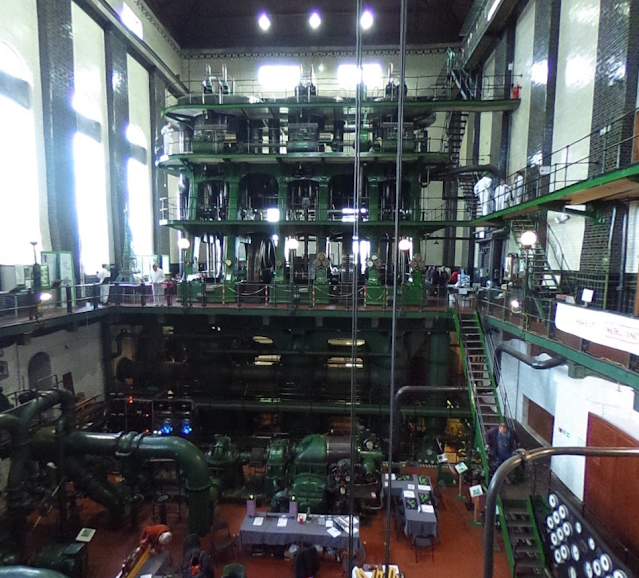Kempton Park: (
Satellite, 1,384 photos)
London Museum of Water & Steam: (
Satellite, 2,744 photos)
Once again, water supply pumping used large steam engines.
The two triple-expansion pumps started in 1929, and the two turbines started in 1933. All of the steam power was replaced by electric pumps in 1980.
Fortunately, they placed men on various levels to provide a better sense of scale.
 |
KemptonSteam
"Kempton Steam Museum is the home of the world’s largest working triple-expansion steam engine known as ‘The Sir William Prescott Engine’. The engine sits amongst two steam turbines and opposite an identical twin called ‘The Lady Bessie Prescott Engine,’ which is currently being restored....The two engines and two steam turbines pumped vast volumes of London’s drinking water from 1929 until 1980 when electric pumps in an adjacent building superseded them." |
 |
Shirley Rocha posted
The Sir William Prescott at Kempton Park Steam Museum in London is the world's largest operating triple-expansion steam pumping engine. Standing 62 feet high and weighing 800 tons, this engine is similar in size to those used on the RMS Titanic. It was built in 1928 by Worthington Simpson Ltd. and commissioned in 1929 to pump between 12 and 19 million gallons of water per day to reservoirs in North London. The engine, which operates at a top speed of 25.4 RPM with an original steam pressure of 200 PSI (reduced to 60 PSI for preservation), has three double-acting cylinders measuring 29, 54, and 86 inches in diameter, respectively. The engine's crank webs are set 120 degrees apart, ensuring smooth and balanced operation. Visitors can see the Sir William Prescott in action during select steaming weekends throughout the year at the museum. |
 |
KemptonSteam_triple
"The triple-expansion engines at Kempton Park are similar in design and size to the engines onboard the RMS Titanic. They are often used in films and documentaries about the ill-fated ship."
Among the specifications on this webpage: The cylinder diameters are 29" (.7m), 54" (1.4m) and 86" (2.2m). The stroke is 5.5' (1.7m), and it has a top speed of 25.4 rpm. |
One of the turbines and pumps is open.
1 of several 360-degree photos
Same photo, but turned around about 180 degrees.
 |
Ocean World posted
The world's largest triple expansion steam pumping engine still in operation, at Kempton Park Steam Museum, London 62ft [19m] high and weighing 800 tons, the 'Sir William Prescott' is the size of the engines on RMS Titanic. It has been restored to working order and can be seen in steam on certain weekends during the year. The Sir William Prescott at Kempton Park Steam Museum in London is the world's largest operating triple-expansion steam pumping engine. Standing 62 feet high and weighing 800 tons, this engine is similar in size to those used on the RMS Titanic. It was built in 1928 by Worthington Simpson Ltd. and commissioned in 1929 to pump between 12 and 19 million gallons of water per day to reservoirs in North London. The engine, which operates at a top speed of 25.4 RPM with an original steam pressure of 200 PSI (reduced to 60 PSI for preservation), has three double-acting cylinders measuring 29, 54, and 86 inches in diameter, respectively. The engine's crank webs are set 120 degrees apart, ensuring smooth and balanced operation. Visitors can see the Sir William Prescott in action during select steaming weekends throughout the year at the museum. |
 |
Kempton Steam Museum posted
This excellent photograph shows the Sir William Prescott engine in the erecting shop at the Worthington Simpson factory in Newark-on-Trent. The engines were designed and built by Worthigton Simpson but many steel components were made in Glasgow by William Beardmore & Sons. The engines were test assembled in Newark before being dismantled and transported to Kempton Park by rail. You can see this massive machine in operation at our next steaming weekend on the 16th & 17th November. |
London Museum of Water & Steam
This museum has a collection of several steam-powered pumps.
%20Facebook.png) |
Facebook reel
[The steam is used, not created in the first cylinder. Steam is created in a boiler.] |











%20Facebook.png)
%20Facebook.png)
%20Facebook.png)

No comments:
Post a Comment